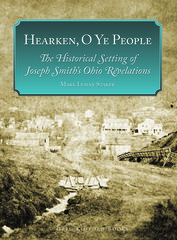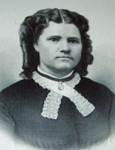-
•
•
6 responses

The following is a translation from an article written by Emanuel Santana and published on the Brazilian group blog, Vozes Mórmons. I have divided it into three parts because the post is so long and raises so many questions about politics and the Church—things that strike me as repeatedly-covered issues in the U.S. and perhaps Canada, but which are new territory in Brazil and elsewhere around the world. This first part covers background information, from the introduction of the Church in Fortaleza to Moroni Torgan’s arrival and rise to prominence as Brazil’s first Mormon Congressman. Read More
-
•
•
3 responses
The corruption and internal strife in the initial chapters of Helaman are marked by the rise of secret combinations among the Nephites and Gadianton’s rule over the band eventually known as Gadianton’s Robbers. While I think our society today is far from the level of corruption seen then, we certainly deal with similar corruption to a smaller degree. And societies we do know today (perhaps Somalia and Zimbabwe and probably others also) seem as corrupt or worse than what the Nephite’s had to deal with. It is hard to imagine how anyone survives such regimes without also becoming corrupt. Read More
-
•
•
4 responses
-
•
•
15 responses

The Mormon conception of God encompasses both a Heavenly Father and a Heavenly Mother. However, we almost never talk about our Heavenly Mother. In this series, I’ll give you a peek into my own personal journey toward learning to know my Heavenly Mother. Like many Mormons, I grew up always knowing about Heavenly Mother, but never really talking about Her. And honestly, the relative absence of my Heavenly Mother didn’t ever bother me much. In fact, when I thought of Her at all, I thought of Her as a sort of special, beautiful secret, or an esoteric doctrine I found… Read More
-
•
•
4 responses
This guest review was written by Nathan Smith, age 11. Read More
-
•
•
8 responses

I received my review copy of Hearken, O Ye People at work; I opened it and began to read on the El heading home. And, from page 1 (or, actually, page xvii), my jaw dropped. Staker started his book with an almost-15-page chronology of Kirtland, beginning in May 1796 as a group begins to survey townships in the Western Reserve and ending on July 6, 1838, when Kirtland Camp leaves Kirtland to settle in Missouri. For that chronology alone, Hearken, O Ye People is worth its price, at least for those form whom the Kirtland years are overshadowed by the… Read More
-
•
•
53 responses
We talk about our Heavenly Father loving us, and our leaders say they love us, but sometimes it feels like they mean “us” in general, and not “me” in particular. We are told that almost any righteous man and woman can have a successful marriage if they are both committed, if both of them have enough faith to do everything right. [fn1] The particulars of the individuals, the quirks and preferences that make up our personalities, don’t much matter. And many couples in contented arranged marriages can testify to the viability of this idea. In the same way, any given… Read More
-
•
•
21 responses
Today is the 15th anniversary of the end of my mission. (Note that I can’t entirely remember what I mean by that—I’m pretty sure that August 5, 1997, was my last day of proselytizing, the 6th I got on an airplane, and the 7th I arrived home. But it has been 15 years, and I’m not 100% sure.) And what does that two years mean to me, 15 years later? On one level, not a whole lot. I don’t think about it a whole lot; my days are much more likely spent occupied by the Internal Revenue Code. Or my… Read More
-
•
•
3 responses
The story of Helaman’s 2060 stripling warriors (the subject of Sunday School lesson #33) is another of the most cited and, I assume, the more beloved among young men and boys. However, the main idea broached in the lesson, that these young men were righteous and obeyed “every word of command with exactness,” could easily be lost in the midst of their military valor. The stripling warriors, like many of those who serve in military service around the world today, are indeed heroes—but, Eliza R. Snow observes that there are other, more valuable ways to be a hero: Read More
-
•
•
12 responses
-
•
•
5 responses
Christopher Jones has a post over at the fine group blog Peculiar People listing ten books on modern Mormonism. The post deserves more discussion, so I thought I’d post my own short comments on the first four books from the list and invite readers to add comments on the others as well as reflection on the original post by Jones. Read More
-
•
•
34 responses

Too much attention to those awkward stones just adds to them and makes a dam, and I seriously don’t want to have to bring out the dynamite and blow it away. Read More
-
•
•
One response

The 10 chapters in this week’s Sunday School lesson (#31) are among the most exciting in the Book of Mormon—at least if you are a 10-year-old boy. They tell the story of Captain Moroni, the battles he fought for freedom, and his “Title of Liberty.” Of course, even for adults they are important chapters, detailing a struggle for liberty and raising the kind of questions that so many in the world have to face, even today, when addressing what kind of government their country needs. Even in most western democracies, the issues of liberty have at least a peripheral connection… Read More
-
•
•
2 responses
-
•
•
58 responses
Some Sundays three hours is more like eternity squared. Discuss. Read More
-
•
•
17 responses
![Book of Mormon Word Cloud [updated]](https://timesandseasons.org/wp-content/uploads/2012/07/WordItOut-Word-cloud-96918.png)
I’ve been curious what a word cloud of the Book of Mormon would look like, so , just for fun on a Friday, I finally made one. I don’t have a lot to say about it, other than that “unto” seems to be a very popular word (which doesn’t really surprise me, but I didn’t expect, either). “Lamanite” shows up more than “Nephite,” though the usage of both is dwarfed by “people.” I took the text from the 1830 edition of the Book of Mormon, and I copied it from here, and I made the cloud using WordItOut. (Note that… Read More
-
•
•
4 responses
Since these take a long time to write up, and the answers can be fairly dense, I’ve broken up the answers further. (Edit: Here is the original post without any answers, and answers part 1.) 18) On the back of this paper, provide a brief outline of 2 Nephi. Outlining is a tool useful at several levels of the text (book, chapter, verse), that can help one see logical connections in the text. Faulconer has an explanatory chapter on it here, and here’s what my quick sample outline of 2 Nephi looked like. 19) Who took a transliteration of Book… Read More
-
•
•
94 responses
At the age of two, my daughter Axa could point out an immodest outfit in a shop window. At five, she added sleeves to the dress on the princess picture her babysitter had drawn for her. Although I don’t recall making any special effort to teach her about modesty, I was surprised and gratified that she understood the concept at such a young age. However, lately I’ve been having disquieted feelings when she brings up modesty, as I realize that something in the nuance of what I’ve taught has gone awry. And then just a few weeks ago, something happened… Read More
-
•
•
63 responses
[Times & Seasons welcomes the second in a pair of posts from Ralph Hancock this week, who previously guested with us in 2010] I argued in Part I that the move from “apologetics” to “Mormon Studies” requires a bracketing of truth claims that may serve legitimate scholarly purposes, but that carries with it certain significant risks. The New Mormon Studies presents orthodoxy as stifling and itself as intellectually liberating, but it risks purveying a more subtle and powerful conformism, the conformism of secular academic prestige and careerism. This is intended, not as a condemnation, but as an alert. We ought to embrace opportunities… Read More
-
•
•
30 responses
Anything I’m able to think is because of everything I feel. And everything I feel is this wonderful embodiment, this solid physicality. Everything begins as physical sensations that are then co-opted, abstracted, and re-appropriated by the mind. Love in the abstract began as a warm feeling of security and comfort and a belly full of milk. It grows into trust and affection. From our instinctive feelings of approval and disapprobation we develop judgment, ethics, and morality. Everything we call virtuous began with some action that met our approval, that felt good, was beautiful or useful to ourselves or others and… Read More
-
•
•
30 responses
Is the existence of God, for you, an obvious and uncontroversial feature of any common sense way of seeing the world? Has it always been so profoundly and straightforwardly given that you could not deny it? If so, then in what sense would we be right to say that such a belief is either praiseworthy or blameworthy? Read More
-
•
•
3 responses

As Alma talks with his son Corianton in Alma 40-42, he realizes that Corianton does not understand some basic elements of the Plan of Salvation. From what Alma teaches him, we can surmise that Corianton doesn’t understand that all will be resurrected, that each person will be resurrected according to their words in this life (the righteous to happiness and the wicked to misery), and the roles that justice and mercy play in the great plan of happiness. From the context, it is clear that all these teachings were in response to Corianton’s misdeeds while serving a mission, a similar… Read More
-
•
•
6 responses
-
•
•

Shakespeare’s been critical for me at critical junctures in my life. In Mormonism where The Bard is revered, I think this is common. In Junior High Hamlet was the gift of language that bootstrapped the monkey into a meaningful world. Celebrating the Ides of March together with the woman I desperately wanted to marry reversed the obvious set-up for a tragedy. It’s a memorial my family continues to celebrate each year with a brief family Shakespearapalooza. This last week has been filled with Shakespeare, culminating last night with a dream date my wife took me on to the Royal Shakespeare… Read More
-
•
•
75 responses
[Times & Seasons welcomes the first in a pair of posts from Ralph Hancock this week, who previously guested with us in 2010] The recent unpleasantness at BYU’s Maxwell Institute has, the reader will have noticed, triggered much comment on the internet, including celebrations in some quarters over the supposed demise or at least eclipse of certain defenders of the faith at the Institute —characterized by some as apologists — who have been willing over the years to call out arguments they see as weakly reasoned and hold critics of the Church to account for their claims. Although I do not know… Read More
-
•
•
41 responses
As most readers here no doubt know, Mormon academic and author Stephen R. Covey died earlier this week. Covey was best known for his highly popular self-help book, The Seven Habits of Highly Effective People, which earned him fame and fortune, as well as some detractors. His death, together with the fact that my bookclub is currently reading Viktor Frankl’s influential book Man’s Search for Meaning and that I came across an old conference talk drawn from a self-help book, led me to ponder a bit about Covey’s influence and self-help books in general and the influence that these… Read More
-
•
•
72 responses
Rachel’s post a couple of weeks ago, The Threat of New Order Mormons, attracted so much discussion that I would like to follow up with my own discussion of middle-path Mormons. Various terms are used to describe those who self-categorize themselves as something other than fully active, fully believing Mormons: Uncorrelated Mormons, Cultural Mormons, New Order Mormons, Liahona Mormons, and so forth. My view is that there are many paths that lead away from full activity and belief, so it is wrong to expect one label to adequately describe what is actually happening. It’s clear these members move away from… Read More
-
•
•
3 responses
I’ve struggled with what to write in response to chapter 5 of The Problems of Theism and the Love of God. Why? Because, except when it comes to nit-picky details, I’m in full agreement with Ostler for once. Indeed, I applaud this chapter and am eager to see how he moves forward with it in the next chapters. What to write, then? For fun, I think I’ll just insert here, as a kind of confirmation of what Ostler has to say, my own recent written reflections on Romans 1—a passage he cites on page 162. Here is the passage in… Read More
-
•
•
22 responses
So how many people do we think will exist in the whole of humanity throughout our history? Read More
-
•
•
2 responses
Alma 36 to 39 contain Alma’s advice to his three sons, Helaman, Shiblon and Corianton, which led me to the idea of parental advice—something that usually accumulates bit by bit over years rather than all in one block as Alma seems to have done with his sons. Of this advice, perhaps the most famous, especially when it comes to Mormon literature, is the advice given to Corianton and the reason for that advice. Corianton’s story has been the source for dozens of literary works — so much so that encountering a character in a Mormon story named “Cory” should automatically… Read More
